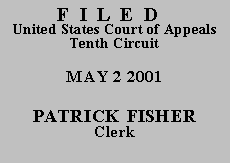

|
JERRY P. McNEIL, |
|
Before HENRY, BRISCOE, and MURPHY, Circuit Judges.
Jerry P. McNeil, proceeding pro se, appeals the district court's dismissal of his complaint. McNeil filed his complaint in district court naming as defendants William Jefferson Clinton and the United States of America. In his complaint, McNeil sought issuance of an injunction which would deny former President Clinton the post-incumbency benefits to which he would otherwise be entitled to receive under federal law. McNeil sought this relief on the ground that President Clinton, as alleged in the complaint, committed "unlawful, and unconstitutional, and unconscionable conduct" during the term of his Presidency. Pursuant to the government's motion to dismiss, the district court dismissed McNeil's complaint with prejudice. In so doing, the district court noted that McNeil had failed to state a claim upon which relief could be granted because he could not cite to any federal statute or other authority which would support a claim against the defendants and authorize the granting of the relief requested. Relatedly, the district court concluded that McNeil lacked standing to object to the payment of post-incumbency benefits to President Clinton because McNeil could not demonstrate a concrete and particularized actual or imminent injury. See Sac & Fox Nation v. Pierce, 213 F.3d 566, 573 (10th Cir. 2000). Furthermore, McNeil did not fit into the limited exception recognized by the courts for taxpayer standing because he could not demonstrate a nexus between congressional appropriations of post-incumbency benefits to President Clinton and an infringement of McNeil's constitutional rights. See Chrisman v. C.I.R., 82 F.3d 371, 373 n.1 (10th Cir. 1996).
This court reviews the district court's dismissal of McNeil's complaint de novo. See Chemical Weapons Working Group, Inc. v. United States Dep't of the Army, 111 F.3d 1485, 1490 (10th Cir. 1997) (holding that dismissal pursuant to Fed. R. Civ. P. 12(b)(6) for failure to state a claim is reviewed de novo); Chrisman, 82 F.3d at 372 (holding that standing is a question of law reviewed de novo). Upon de novo review of the district court's order of dismissal dated October 13, 2000, the district court's order denying reconsideration dated November 6, 2000, the parties' briefs and contentions, and the entire record on appeal, this court affirms the dismissal of McNeil's complaint for substantially those reasons set out in the district court orders referenced above.(1)
The order of the United States District Court for the Northern District of Oklahoma is hereby AFFIRMED.
ENTERED FOR THE COURT:
Michael R. Murphy
Circuit Judge
*. This order and judgment is not binding precedent, except under the doctrines of law of the case, res judicata and collateral estoppel. The court generally disfavors the citation of orders and judgments; nevertheless, an order and judgment may be cited under the terms and conditions of 10th Cir. R. 36.3.
1.We note that McNeil's seeming contention that the district court erred in failing to grant him default judgment is frivolous. Although his brief is less than clear on this point, McNeil seems to assert that he was entitled to default judgment under Fed. R. Civ. P. 55 because the defendants failed to file an answer to his complaint. Rule 55 clearly provides, however, that default judgment is only appropriate when "a party against whom a judgment for affirmative relief is sought has failed to plead or otherwise defend as provided by these rules." Fed. R. Civ. P. 12 makes clear that a pre-answer motion to dismiss is an appropriate defense for purposes of Rule 55 and that no answer is due until the district court resolves the motion, unless the district court postpones the disposition of the motion until the trial on the merits. See Fed. R. Civ. P. 12(a)(1), (a)(4)(A); see also Brooks v. Sauceda, No. 00-3025, 2000 WL 1730892, at *2 (10th Cir. Nov. 22, 2000) (non-binding unpublished disposition cited for its persuasive value pursuant to 10th Cir. R. 36.3) (rejecting a similar argument and noting that default judgment was not appropriate in a case with a procedural posture similar to that present in this case).